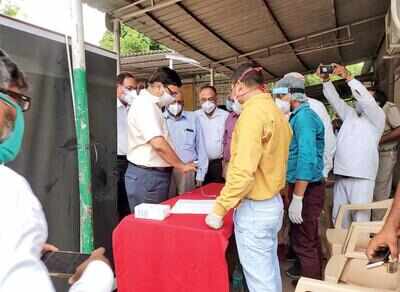
NOIDA/GHAZIABAD: The Uttar Pradesh government has requested a Niti Aayog team to provide 5 lakh rapid antigen test kits so that testing can be scaled up in its NCR cities.
The request was made during a high-level meeting chaired by Niti Aayog member Vinod Kumar Paul in Ghaziabad on Tuesday. The session was attended by additional chief secretary (health and family welfare) Amit Mohan Prasad, Meerut divisional commissioner Anita Meshram, the district magistrates of Noida and Ghaziabad and other senior officials.
Sources said that before making the request for antigen kits, Prasad apprised the Niti Aayog team that around 11 lakh tests had been conducted across the state and special drives were being organised to increase surveillance.
Mehram provided detailed information about action taken to tackle the spread of Covid in the four districts under Meerut division. She said 1.75 lakh tests had been conducted in these areas so far and the special testing drive between July 2 and 12 had identified 14,333 people with virus-like symptoms. The divisional commissioner added that 742 Covid-19 helpdesks had been set up in these districts and 2,277 monitoring committees were working in the urban and rural areas.
Ghaziabad district magistrate Ajay Shankar Pandey requested the Niti Aayog team to direct government hospitals in Delhi not to turn away patients from neighbouring areas. Sources said Paul had assured the DM he would look into the matter.
Pandey also suggested a uniform containment policy for Delhi areas bordering Ghaziabad. “As cross-border movement is very high in these areas, a common approach to curb the spread of infection will prove beneficial. For instance, had Delhi implemented the sector scheme like we did in Loni and Khoda, it would have helped in controlling the cases better,” the DM said.
Paul appreciated Noida officials for managing to keep the death rate below 1% despite the district having the highest number of cases in the state. He also hailed efforts to scale up testing in the NCR cities.
Referring to the spread of infection in the Dharavi slum area of Mumbai, Paul suggested that Noida should also document its efforts in tackling Covid cases in JJ Colony, which has been the largest cluster of the district with more than 70 cases so far.
“The committee has asked us to document how cases were controlled in JJ Colony of sectors 5-10. They appreciated the strict containment measures. We will prepare a report soon,” said Suhas LY, the Noida DM.
Paul also took note of Ghaziabad’s efforts in bringing down the death rate in the first few days of this month. The district’s fatality rate was 3.9% with 51 deaths in June. The death rate has been just 0.32% with five deaths between July 1 and 11.
The Niti Aayog team asked the four districts to run Dhanvantari Raths like Ahmedabad. The rath is a medical van having medicines for common ailments such as fever and cough, along with a team of doctors and paramedical staff. This apart, the van also has some testing facilities.
Earlier in the day, Prasad inspected the building at MMG District Hospital, where an RT-PCR lab will be set up. Built at a cost of Rs 50 lakh, the lab in Ghaziabad is likely to be functional from July 20. Of the nine staffers who will work there, six will be recruited by the state government.
Prasad held another meeting in Noida, where he asked officials to improve efforts at contact tracing. When officials said that three primary contacts were found for every Covid patient, the senior bureaucrat dubbed it low. He added that the state would provide more antigen test kits to the district soon.
The request was made during a high-level meeting chaired by Niti Aayog member Vinod Kumar Paul in Ghaziabad on Tuesday. The session was attended by additional chief secretary (health and family welfare) Amit Mohan Prasad, Meerut divisional commissioner Anita Meshram, the district magistrates of Noida and Ghaziabad and other senior officials.
Sources said that before making the request for antigen kits, Prasad apprised the Niti Aayog team that around 11 lakh tests had been conducted across the state and special drives were being organised to increase surveillance.
Mehram provided detailed information about action taken to tackle the spread of Covid in the four districts under Meerut division. She said 1.75 lakh tests had been conducted in these areas so far and the special testing drive between July 2 and 12 had identified 14,333 people with virus-like symptoms. The divisional commissioner added that 742 Covid-19 helpdesks had been set up in these districts and 2,277 monitoring committees were working in the urban and rural areas.
Ghaziabad district magistrate Ajay Shankar Pandey requested the Niti Aayog team to direct government hospitals in Delhi not to turn away patients from neighbouring areas. Sources said Paul had assured the DM he would look into the matter.
Pandey also suggested a uniform containment policy for Delhi areas bordering Ghaziabad. “As cross-border movement is very high in these areas, a common approach to curb the spread of infection will prove beneficial. For instance, had Delhi implemented the sector scheme like we did in Loni and Khoda, it would have helped in controlling the cases better,” the DM said.
Paul appreciated Noida officials for managing to keep the death rate below 1% despite the district having the highest number of cases in the state. He also hailed efforts to scale up testing in the NCR cities.
Referring to the spread of infection in the Dharavi slum area of Mumbai, Paul suggested that Noida should also document its efforts in tackling Covid cases in JJ Colony, which has been the largest cluster of the district with more than 70 cases so far.
“The committee has asked us to document how cases were controlled in JJ Colony of sectors 5-10. They appreciated the strict containment measures. We will prepare a report soon,” said Suhas LY, the Noida DM.
Paul also took note of Ghaziabad’s efforts in bringing down the death rate in the first few days of this month. The district’s fatality rate was 3.9% with 51 deaths in June. The death rate has been just 0.32% with five deaths between July 1 and 11.
The Niti Aayog team asked the four districts to run Dhanvantari Raths like Ahmedabad. The rath is a medical van having medicines for common ailments such as fever and cough, along with a team of doctors and paramedical staff. This apart, the van also has some testing facilities.
Earlier in the day, Prasad inspected the building at MMG District Hospital, where an RT-PCR lab will be set up. Built at a cost of Rs 50 lakh, the lab in Ghaziabad is likely to be functional from July 20. Of the nine staffers who will work there, six will be recruited by the state government.
Prasad held another meeting in Noida, where he asked officials to improve efforts at contact tracing. When officials said that three primary contacts were found for every Covid patient, the senior bureaucrat dubbed it low. He added that the state would provide more antigen test kits to the district soon.

Coronavirus outbreak
Trending Topics
LATEST VIDEOS
City
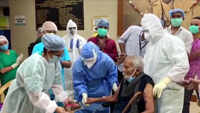 Watch: 101-year-old Mumbai man recovers from Covid-19, hospital staff celebrates his birthday
Watch: 101-year-old Mumbai man recovers from Covid-19, hospital staff celebrates his birthday 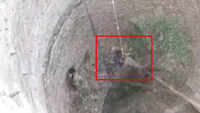 On cam: Drunk man falls into 100-feet-deep dilapidated well, rescued in Andhra Pradesh
On cam: Drunk man falls into 100-feet-deep dilapidated well, rescued in Andhra Pradesh 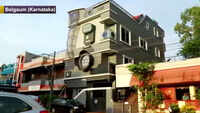 Love for photography: Man builds 3-storey camera-shaped house in Karnataka’s Belagavi
Love for photography: Man builds 3-storey camera-shaped house in Karnataka’s Belagavi 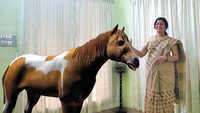 Kochi school teacher uses Augmented Reality Technology for conducting Lower Primary online classes
Kochi school teacher uses Augmented Reality Technology for conducting Lower Primary online classes
More from TOI
Navbharat Times
Featured Today in Travel
Quick Links
Kerala Coronavirus Helpline NumberHaryana Coronavirus Helpline NumberUP Coronavirus Helpline NumberBareilly NewsBhopal NewsCoronavirus in DelhiCoronavirus in HyderabadCoronavirus in IndiaCoronavirus symptomsCoronavirusRajasthan Coronavirus Helpline NumberAditya ThackerayShiv SenaFire in MumbaiAP Coronavirus Helpline NumberArvind KejriwalJammu Kashmir Coronavirus Helpline NumberSrinagar encounter
Get the app



